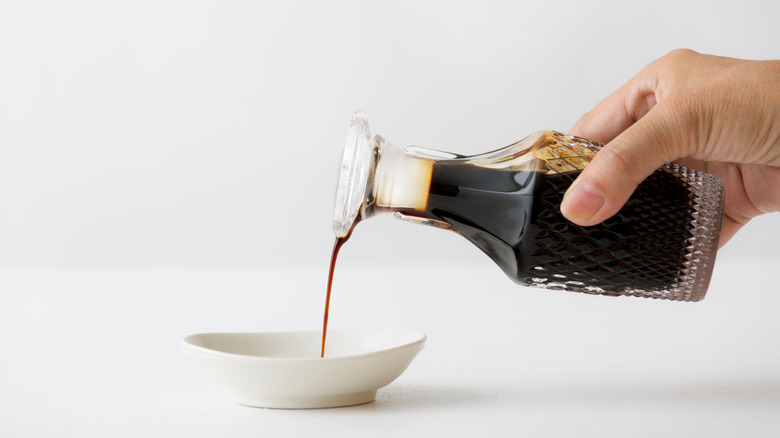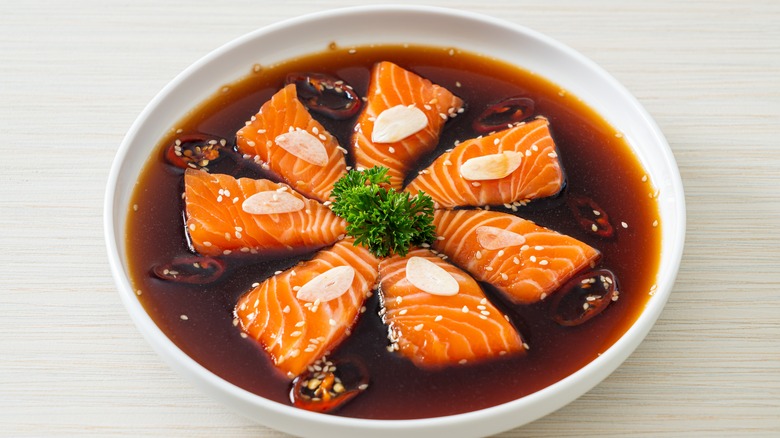Fish Sauce Vs. Oyster Sauce: What's The Difference?
What is a hot dog without relish, mustard, or ketchup? A cookout without some chili paste to spice up your burgers? Almost any kind of soup without a splash of tabasco? Our culinary experience these days revolves around the quality of our condiments, and who can blame us? With all these various and easy-to-access sweeteners and spices, it's hard to resist slathering pre-made barbecue sauce over everything you grill or jazz up your sandwiches without some kind of pesto and balsamic.
But regardless of whether your refrigerator is chock full of various condiment bottles or eerily empty, some dishes require the use of different sauces, especially if you're cooking up tried and true recipes from China or Southeast Asia. Food Network says that you must have some essential condiments if you plan on whipping up Asian recipes any time soon, such as sambal oelek, hoisin sauce, miso paste, plum sauce, gochujang, and, of course, oyster and fish sauce. Oyster and fish sauce are perhaps the most basic yet important of these to have in your arsenal, but they are not the same, so it's best to have both on hand.
What is fish sauce?
But what exactly are oyster and fish sauces, and why do they differ? Well, as you can probably tell from their names, these sauces are made from different seafood. Fish sauce, in particular, is made by mixing fish, usually sardines, anchovies, and shrimps, with salt and pressing it, leaving it to ferment for months into an umami and meat-flavored brown liquid (via Fermented Foods in Encyclopedia of Food Microbiology). Fish sauce is essential to all kinds of dishes in the East, but as it has become more accessible in Western markets, it is now used worldwide to bring depth and flavor to quite a few dishes, whether you are grilling, sautéing, stir-frying, or marinating your dishes. Serious Eats claims that fish sauce is and can be a condiment that can bring nuance to everything from salad and pasta dressings, soup and stew broths, fried rice, and even savory cocktails such as a Kimchi Bloody Mary.
According to Bon Appétit, this fermentation fish concoction has been used for centuries. The ancient Greeks and Chinese have reportedly used it as well; still, today it is well beloved and utilized in many culture's traditional dishes, especially in South Asia, as a way to highlight the earthy flavors trapped in our veggies and the natural richness of meats. This sauce is a must-have in your kitchen if you plan on preparing Korean, Chinese, Vietnamese, Myanmarese, Cambodian, Lao, Filipino, or Thai food any time soon.
What is oyster sauce?
As for the oyster sauce, we're willing to bet you know where this specific condiment comes from! Invented in the year 1888, it is much younger than its fish sauce counterpart but no less beloved. Hungryhuy says that oyster sauce, like many of our favorite foods, was made by accident by Chinese cook Lee Kum Sheung when he overcooked the broth for his oyster soup, and it became brown, syrupy, and maintained its salty flavor while also becoming a bit sweet. Oyster sauce then became widely used in Chinese, Cantonese, Thai, Vietnamese, and Cambodian cuisine, and Lee Kum Sheung opened his own successful oyster sauce company.
According to Kids Are Great Cooks, oyster sauce is commonly applied to savory foods and is often mixed with other items to make stir-fry sauces, glazes, and marinades, and pairs beautifully with chicken, beef, veggies, noodles, and rice. Oyster sauce is also key to making homemade versions of our other favorite relishes, such as hoisin sauce or teriyaki sauce. Traditionally, this ingredient is created the way Lee Kum Sheung originally made it, though some companies make something they call "oyster-flavored sauce," which is just a mix of sugar, salt, cornstarch, and oyster flavoring (via The Woks of Life). So keep an eye out for deceptive branding and when a recipe calls for oyster sauce, try to find the real deal for the best quality.
Can you swap them out?
If you read the above or have deductive thinking skills, you'll know that fish sauce and oyster sauce are made from two very different seafood products and in two very different ways. Fish sauce is liquid, while oyster sauce is thicker. Fish sauce is fermented, while oyster sauce is caramelized. MasterClass says that when it comes down to taste, fish sauce is much saltier and deeply pungent and doesn't have the sweetness and subtleness that oyster sauce has. This means that these two items are quite different in flavor and method of use; however, they are often used on the same kinds of dishes (soups, meat, veggies, noodles, rice, and the like).
That being said, oyster sauce can replace fish sauce in most recipes; while less potent, it will still give your food that briny, umami note you want. Healthline claims that you can use a 1:1 ratio to replace fish with oyster sauce in your recipe. As for the best substitutes for oyster sauce, remember that fish sauce is thinner and not sweet, so if you want, you can add a bit of sugar to it to help it thicken and sweeten up. In fact, a classic Vietnamese sauce (Nước chấm) is made by mixing fish sauce and sugar along with a few other ingredients to create the perfect sweet and savory dip for spring rolls and noodles (via Drive Me Hungry).



